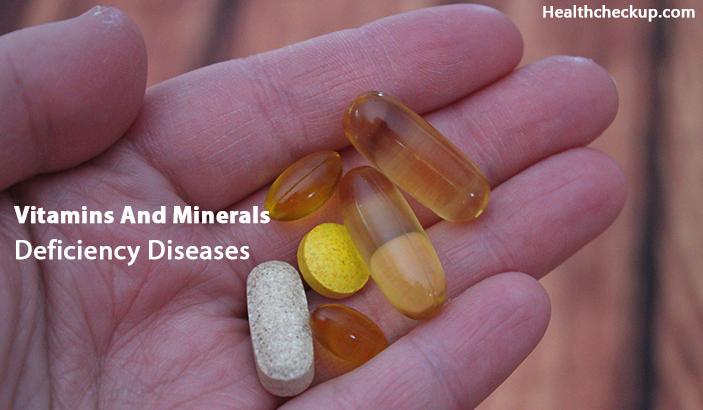What Is Vitamin And Mineral Deficiency?
Vitamins and minerals are essential nutrients that your body needs in trace amounts. These are required for almost every process in your body to function normally. A few vitamins include vitamins A, C, D, E, K, and the B group of vitamins and minerals such as calcium, magnesium, phosphorus, potassium, sodium, and iron.
Some important functions of vitamins and minerals include wound healing, strengthening the immune system, converting food into energy, maintaining healthy bones, and promoting healthy teeth.
[Also Read: Tests for weak immune system]
The vitamins and minerals are obtained from dietary sources. A vitamin or mineral deficiency occurs when your body fails to get them in adequate amounts. People who follow a poor diet, eat low-quality foods, or fail to take supplements if required are at an increased risk.
A deficiency is detected in blood tests when patients get tested on experiencing the related symptoms. Once detected, vitamin and mineral deficiency is addressed by following a healthy diet containing the required nutrients or through supplements. Severe cases may require IV infusions to replenish the missing nutrients. Diseases caused by the deficiency of vitamins and minerals include visual and skin changes, bone health issues, anemia, neurological problems, and blood clotting problems.
Symptoms Of Vitamin And Mineral Deficiencies
There are a wide range of vitamins and minerals, hence the symptoms of a deficiency can vary.
Some symptoms of nutrient deficiency include;
- Weakness
- Fatigue
- Pale skin
- Shortness of breath
- Hair loss
- Problems with concentration
- Constipation
- Depression
- Numbness or tingling sensation in the joints
- Faster heartbeat
- Muscle cramps
- Poor night vision
- Scaly patches of skin
- Burning sensation in the feet, sometimes in the tongue
- Growth on the eyes that are white
| Symptoms | Vitamin/Mineral Deficiency |
|---|---|
| Fatigue | Iron, vitamin B12, and vitamin D |
| Nausea, muscle spasms, bone weakness, and muscle cramp | Magnesium |
| Delayed wound healing, bleeding, or swollen gums | Vitamin C |
| Impaired night vision | Vitamin A |
| Acne | Zinc |
| Rashes and mouth ulcers | Multiple vitamins |
| White coated tongue | Vitamin B |
| Muscle pain, bone pain, and weakness in the pelvis, lower back, and legs | Vitamin D |
| Physical and mental fatigue, hair loss, pale skin, and pale tongue | Iron |
| Brittle hair and nails | Iron and vitamin B7 |
| The weak bone that can cause frequent fractures | Calcium |
| Frequent cold or infections because of a weakened immune system | Multiple nutrients |
| High blood pressure | Potassium |
| Mood swings, low energy, feeling down, and irritability | Vitamin B |
| Skin issues such as dry skin and wrinkled skin | Vitamins A, C, and E |
| Poor blood clotting, skin bruising | Vitamin K |
Causes Of Vitamin And Mineral Deficiencies
A healthy, varied, and well-balanced diet usually provides all the vitamins and minerals that are adequate for optimal health. But deficiencies can occur because of several causes. Some common causes include:
- Not being able to absorb nutrients well from the diet. For example, if you are suffering from coeliac or Crohn’s disease.
- Lack of fruits or vegetables in your daily diet
- Following a poorly designed vegan or vegetarian diet
- Excessive alcohol intake
- Certain medications such as proton pump inhibitors (PPIs)
- Pregnancy, wherein the body has increased nutritional requirement
It is good to get your vitamin and mineral levels checked, especially if you have symptoms or health risks of nutritional disorders.
Vitamin Deficiency Test
Nutrient deficiency diseases are diagnosed through blood tests like;
A Venous Blood Test
The blood sample is obtained using a needle to puncture a vein, usually in your arm.
A Finger-prick Blood Test
The blood sample is collected by pricking your finger using a lancet
List Of Disease Caused By A Deficiency Of Vitamins And Minerals
Few common diseases caused by a deficiency of vitamins and minerals include;
Osteoporosis
- Osteoporosis is caused by calcium and vitamin D deficiency.
- Is characterized by reduced bone density, bone loss, and risk of fractures.
Rickets
- Caused by vitamin D and calcium deficiency
- Leads to soft and weak bones
- The condition affects infants and children resulting in delayed growth, bowed legs, and pain in the spine, pelvis, and legs.
Tetany
- Mainly caused by calcium deficiency but is also caused by magnesium and potassium deficiency.
- It causes numbness, tingling sensation in hands or feet, abdominal pain or cramping, diarrhea, and muscle pain.
Goiter
- Caused by iodine deficiency
- Causes swelling and pain in the neck
- Appears as a lump at the front of the neck
Iron Deficiency Anemia
- Caused by iron deficiency
- The symptoms of anemia include fatigue, weakness, shortness of breath, brittle nails, headache, dizziness, and soreness of the tongue
Beriberi
- Caused by thiamine (vitamin B1) deficiency
- Causes weakness, loss of appetite, shortness of breath, pain in the limbs, and swelling of feet or legs.
Pellagra
- Caused by Niacin (vitamin B3) deficiency
- It is characterized by diarrhea, dementia, oral ulcers, and inflammation of the skin.
Scurvy
- Caused by vitamin C deficiency
- The condition causes anemia, debility, bruising, bleeding gums, pain in the limbs, and loose teeth.
Night Blindness
- Caused by vitamin A deficiency
Hemophilia
- Caused by vitamin K deficiency
- Characterized by increased bleeding
Tips To Prevent Deficiency Diseases
Prevention of nutrient deficiencies is very simple as it involves a nutrient-dense diet every day that provides all the vitamins and minerals to stay healthy.
Getting Tested
A blood test can detect the levels of vitamins and minerals if you are experiencing symptoms of a deficiency. Blood tests can be conducted to assess the deficiency of a specific nutrient.
Evaluate And Eat A Healthy Diet
An ideal way of getting adequate nutrients is by eating a well-balanced diet and avoiding sugars, fast foods, and processed foods.
| Vitamin/Mineral | Dietary Source |
| Calcium | Consume dairy products such as milk, yogurt, or cheese, sardines, dark green leafy vegetables, and calcium-fortified orange juice |
| Folic acid | Eggs, dried beans and peas, fruits, and green leafy vegetables |
| Iron | Beans or legumes, fortified dairy products, egg yolks, poultry, red meat, and fatty fish |
| Magnesium | Whole grains, beans, legumes, green leafy vegetables, and pumpkin seeds |
| Vitamin A | Carrots, pumpkins, mangoes, papayas, sweet potatoes, squash, eggs, and milk |
| Vitamin B12 | Eggs, poultry, meat, fish, milk, and milk products |
| Vitamin C | Citrus fruits, sprouts, spinach, tomatoes and tomato juice, broccoli, cantaloupe, cauliflower, kiwi, sweet potatoes, kale, green and red peppers, and strawberries |
| Vitamin D | Fatty fish (tuna, mackerel, and salmon), beef liver, cheese, egg yolks, cereals, orange juice, and soy milk |
| Potassium | Bananas, nuts, cantaloupe, raisins, nuts, spinach, and fish |
| Vitamin E | Whole-grain foods, seeds, nuts, avocados, and spinach |
| Phosphorous | Peas, eggs, meat, cereals, bread, milk, and other dairy products |
| Sodium | Salt, vegetables, and soy sauce |
In general, a well-balanced diet must include the following foods;
- Green, leafy vegetables
- Fruits
- Nuts and seeds
- Beans
- Whole grains
- Fatty fish
- Egg yolks
- Low-fat dairy products
Consider Using Supplements
Sometimes, a healthy diet may not provide sufficient nutrients for an optimal balance of vitamins and minerals. Supplements containing single essential nutrients or multivitamin formulas are available. You can talk to your doctor to help you know the right balance of supplements.
The diseases caused by a deficiency of vitamins and minerals can be prevented or treated by making simple dietary changes and choosing the right nutrient-rich foods.

Vasavi Attada specializes in creating content for Medical/healthcare domain. She has written articles for Indian Health Organization (IHO), American Diabetes Association, and for magazines such as India Today and Dignity Dialogue.
Vasavi Attada holds a Master’s degree in Microbiology from Bangalore University.









